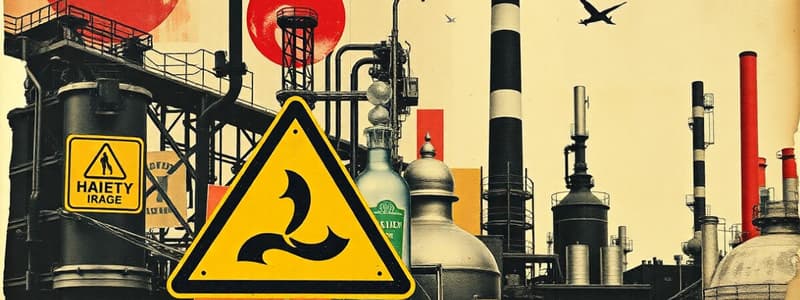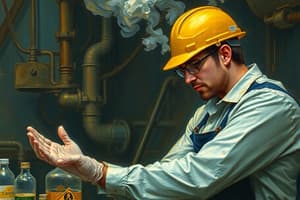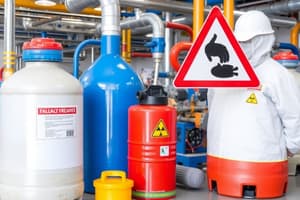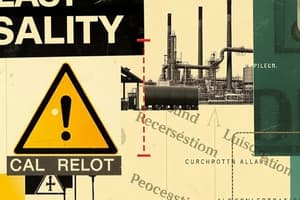Podcast
Questions and Answers
The Manufacture, Storage and Import of Hazardous Chemical Rules were amended in 2000.
The Manufacture, Storage and Import of Hazardous Chemical Rules were amended in 2000.
True (A)
FMEA stands for Failure Mode Evaluation Analysis.
FMEA stands for Failure Mode Evaluation Analysis.
False (B)
Permit to work systems are part of safety control techniques.
Permit to work systems are part of safety control techniques.
True (A)
The concept of disaster management does not include emergency preparedness.
The concept of disaster management does not include emergency preparedness.
Accident investigation helps in the reporting and analysis of performance measures.
Accident investigation helps in the reporting and analysis of performance measures.
Flashcards
Hazard Analysis
Hazard Analysis
A systematic process to identify potential hazards and their associated risks, using techniques like inductive, deductive, FMEA, and CMA.
Fault Tree Analysis
Fault Tree Analysis
A top-down approach to analyzing system failures, tracing back from a specific event (e.g., an explosion) to its root causes.
Risk Assessment
Risk Assessment
Evaluating the likelihood and consequences of identified hazards to determine the overall risk level.
Major Accident Hazard Control
Major Accident Hazard Control
Signup and view all the flashcards
Emergency Preparedness
Emergency Preparedness
Signup and view all the flashcards
Study Notes
Plant and Equipment Safety
- Plant safety observation, inspections, and sampling are crucial for identifying and preventing issues.
- Job safety analysis (JSA) helps to understand and assess safety requirements for tasks.
- A safety inventory system tracks and manages safety equipment, ensuring availability.
- Product safety assessment and control is important for risk mitigation.
- Permit-to-work and safety tag systems are essential for managing hazardous tasks.
- Loss control procedures minimize plant damages from accidents.
- Damage control and system safety minimize adverse effects during accidents.
Laws and Regulations
- Various rules, including those related to hazardous chemicals, chemical accidents, and hazardous waste, govern safety practices.
- Specific examples of relevant regulations include the Manufacture, Storage, and Import of Hazardous Chemical (Amendment) Rules (2000), Chemical Accidents (Emergency Preparedness, Planning and Response) Rules (1986), and Hazardous Waste (Management, Handling and Transboundary Movement) Rules (2008).
Hazards and Risks
- Hazard identification techniques explore different methods for risk analysis, including inductive, deductive, failure mode and effects analysis (FMEA), and consequence modeling analysis (CMA).
- Fault tree analysis helps to understand the combination of events leading to accidents.
- Risk assessment techniques identify and evaluate potential hazards and risks.
- Accident investigation and analysis techniques are used in performance measurement.
- Hazard analysis and measurement techniques help in risk assessment.
Major Accident Hazard Control
- Understanding major accident hazards, their evaluation, types, and consequences is vital.
- The roles of management, local authorities, and the public in addressing major accident hazards are crucial.
- Onsite and offsite emergency planning, utilizing case studies, is part of the mitigation process.
- Implementing control procedures and systems is essential for preventing major accidents.
Importance of Disaster Management
- Disaster management involves local-level emergency preparedness and contingency plans.
- International standards like ISO 14001, OHSA 18001, and OSHA's Process Safety Management (PSM) Systems are important aspects of preparedness.
Studying That Suits You
Use AI to generate personalized quizzes and flashcards to suit your learning preferences.
Description
This quiz covers essential aspects of plant and equipment safety, focusing on safety observation, job safety analysis, and equipment tracking systems. You'll also learn about relevant laws and regulations that govern safety practices in the industry. Test your knowledge on how to minimize risks and ensure safety in hazardous situations.




